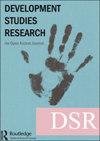Contributions of scientific research to regional development in the Amazonas region, northern Peru
Q2 Social Sciences
引用次数: 1
Abstract
ABSTRACT The relevance of scientific research to local challenges and the need to produce actionable knowledge that benefits local development have not been evaluated. This study evaluates whether scientific research focused on the Amazonas region is framed within its five regional components of the Concerted Regional Development Plan (CRDP) to achieve sustainable development. In this study, 386 scientific articles published during 1960–2021 focusing on the Amazonas region were evaluated. Although Amazonas is the third poorest region in Peru, scientific production in this region has largely increased (CAGR2001-2021 = 16.4%). However, women and indigenous authors are underrepresented suggesting a unilateral knowledge transfer. The highest scientific contribution was reported for component 1 of the CRDP (58%), centering on topics about the conservation of biodiversity and ecosystem services. Scientific research focusing on the Amazonas region fails to fully aboard the overall sustainable components of the CRDP. Social sciences are clearly understudied. It is the role of regional institutions (government, universities, industry, non-profit, etc.) to ensure the extension of research topics covering other dimensions of scientific knowledge and social needs. Conclusively, it is pending that local policymakers take into consideration emerging disciplines that can provide an updated perspective in developmental policies in the Amazonas region.科学研究对秘鲁北部亚马逊地区区域发展的贡献
科学研究与当地挑战的相关性以及产生有利于当地发展的可操作知识的必要性尚未得到评估。这项研究评估了以亚马逊地区为重点的科学研究是否在协调区域发展计划(CRDP)的五个区域组成部分的框架内实现了可持续发展。在这项研究中,对1960年至2021年间发表的386篇关于亚马逊地区的科学论文进行了评估。虽然亚马逊地区是秘鲁第三贫穷的地区,但该地区的科研产量大幅增加(CAGR2001-2021 = 16.4%)。然而,妇女和土著作者的代表性不足,这表明存在单方面的知识转移。据报道,CRDP的组成部分1的科学贡献最高(58%),主要集中在生物多样性保护和生态系统服务方面。以亚马逊地区为重点的科学研究未能充分利用CRDP的整体可持续组成部分。社会科学显然没有得到充分的研究。区域机构(政府、大学、工业、非营利组织等)的作用是确保涵盖科学知识和社会需求的其他方面的研究课题的扩展。最后,当地决策者是否应该考虑新兴学科,为亚马逊地区的发展政策提供一个新的视角。
本文章由计算机程序翻译,如有差异,请以英文原文为准。
求助全文
约1分钟内获得全文
求助全文
来源期刊

Development Studies Research
Social Sciences-Development
CiteScore
3.20
自引率
0.00%
发文量
20
审稿时长
12 weeks
期刊介绍:
Development Studies Research ( DSR) is a Routledge journal dedicated to furthering debates in development studies. The journal provides a valuable platform for academics and practitioners to present their research on development issues to as broad an audience as possible. All DSR papers are published Open Access. This ensures that anyone, anywhere can engage with the valuable work being carried out by the myriad of academics and practitioners engaged in development research. The readership of DSR demonstrates that our goal of reaching as broad an audience as possible is being achieved. Papers are accessed by over 140 countries, some reaching over 9,000 downloads. The importance of the journal to impact is thus critical and the significance of OA to development researchers, exponential. Since its 2014 launch, the journal has examined numerous development issues from across the globe, including indigenous struggles, aid effectiveness, small-scale farming for poverty reduction, sustainable entrepreneurship, agricultural development, climate risk and the ‘resource curse’. Every paper published in DSR is an emblem of scientific rigour, having been reviewed first by members of an esteemed Editorial Board, and then by expert academics in a rigorous review process. Every paper, from the one examining a post-Millennium Development Goals environment by one of its architects (see Vandermortele 2014), to ones using established academic theory to understand development-imposed change (see Heeks and Stanforth 2015), and the more policy-oriented papers that contribute valuable recommendations to policy-makers and practitioners (see DSR Editor’s Choice: Policy), reaches a multidisciplinary audience.
 求助内容:
求助内容: 应助结果提醒方式:
应助结果提醒方式:


